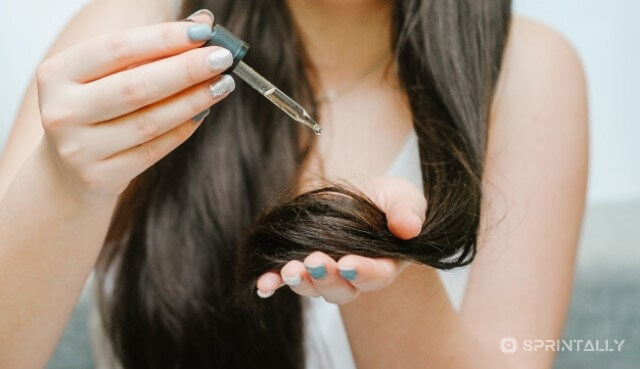9 effective folk remedies for dandruff

Dandruff affects up to 50% of people around the world. Itchy scalp and flaking are the hallmarks of this condition. The main causes of dandruff are dry skin, seborrheic dermatitis and growth of the fungus of a particular type that lives on the scalp.
While there are many over-the-counter drugs for treating dandruff, natural remedies can be just as effective. Here are 9 simple home remedies to help you get rid of dandruff.
Tea tree oil
Historically, tea tree oil has been used to treat many diseases, from acne to psoriasis. It has also been proven to have powerful antimicrobial and anti-inflammatory properties that can alleviate dandruff symptoms. In fact, according to one review, tea tree oil effectively fights a specific strain of the fungus that can cause both seborrheic dermatitis and dandruff.
Another 4-week study examined the effects of tea tree oil on dandruff by daily treatment of 126 people with shampoo containing either 5% tea tree oil or placebo. At the end of the study, tea tree oil reduced the severity of symptoms by 41%, including oiliness and itching.

Please note that tea tree oil may cause irritation in people with sensitive skin. It is best to dilute it by adding a few drops to a carrier oil, such as coconut oil, before applying directly to the skin.
Coconut oil
Coconut oil is widely known for its many health-friendly properties and is also often used as a natural dandruff remedy. It moisturizes the skin, preventing dryness, which can aggravate dandruff.
It was also shown that coconut oil and its compounds have antimicrobial properties, although the effect on a particular strain of the fungus that causes dandruff has not yet been studied.
Aloe vera
Aloe vera is a type of succulent that is often added to ointments, cosmetics and skin lotions. It is believed that when applied to the skin, aloe vera helps to treat skin diseases (burns, psoriasis and herpes).
According to one review, the antibacterial and antifungal properties of aloe vera can protect against dandruff. Similarly, an in vitro study showed that aloe vera is effective against several types of fungi and can control fungal infections that cause hair loss from the scalp.
Stress reduction

It is believed that stress affects many aspects of health and well-being. Although stress alone does not cause dandruff, it can aggravate dryness and itching. In addition, maintaining a high level of stress in the long term can suppress the activity of the immune system.
A weakened immune system can reduce your body’s ability to fight some fungal infections and skin diseases that contribute to dandruff.
In fact, one study involving 82 people with seborrheic dermatitis, which is one of the most common causes of dandruff, showed that most episodes of dermatitis were preceded by a stressful event in life.
To keep stress levels under control, try meditation, yoga, deep breathing, or aromatherapy.
Apple cider vinegar
Apple cider vinegar is often used as a natural dandruff remedy. It balances the pH of the skin, preventing the growth of the fungus and, thus, fights dandruff. However, there is no research to support these claims, and many of the dandruff benefits of apple cider vinegar are based on unconfirmed data.
If you still want to try using apple cider vinegar, add a few tablespoons to your shampoo or mix it with other essential oils and spray directly on your hair.
Aspirin

Salicylic acid is one of the main compounds contained in aspirin, which is responsible for its anti-inflammatory properties. In addition to the content of aspirin, salicylic acid is also found in many dandruff shampoos. It helps get rid of flaky skin and removes scales.
In one study, 19 people with dandruff used two shampoos containing either piroctone olamine in combination with salicylic acid or zinc pyrithione. Both shampoos reduced dandruff after four weeks, but the shampoo containing salicylic acid was more effective.
To prepare a simple dandruff remedy, try to crush two aspirin tablets and add the powder to the shampoo before washing your hair.
Omega-3
Omega-3 fatty acids play an important role in the body. They not only make up the cell membranes that surround your cells, but also improve the functioning of your heart, immune system, and lungs.
Omega-3 fatty acids are important for healthy skin. They promote wound healing and prevent premature aging. Omega-3 fatty acid deficiencies can cause a variety of symptoms, including dry hair, skin, and even dandruff.
Omega-3 fatty acids can also reduce inflammation, which will help relieve irritation and dandruff symptoms.
Oily fish (salmon, trout and mackerel) is an excellent source of omega-3 fatty acids. You can also take fish oil supplements or increase your intake of other foods rich in omega-3, such as flaxseed, chia seeds and walnuts.
Probiotics
There are many potential benefits of probiotics, including protection against allergies, lower cholesterol and increased weight loss. Probiotics can also improve immune function, which helps the body fight fungal infections that cause dandruff.
In fact, one study found that taking probiotics for 56 days significantly reduced the severity of dandruff in 60 people. Probiotics have also been shown to help reduce the symptoms of skin diseases such as eczema and dermatitis, especially in infants and children.
Probiotics are available in the form of supplements, and they are also found in many fermented foods such as Kombucha, kimchi, tempeh, sauerkraut and natto.
Baking soda

Baking soda, which everyone has in the kitchen, is a quick, convenient and easily accessible anti-dandruff agent. It is believed to act as a mild exfoliating agent, removing dead skin cells and reducing peeling and itching. Baking soda also has antifungal properties that may be useful in the treatment of dandruff.
One in vitro study measured the antifungal effects of baking soda on some of the most common fungal strains that cause skin infections. It is impressive that baking soda can completely inhibit the growth of fungi in 79% of samples after seven days.
For best results, try applying baking soda directly to damp hair and massage it into the scalp with massage movements. Leave for a minute or two, then rinse with water.
The next time you notice flakes in your head, try several of these natural remedies. Use them alone or combine with non-prescription drugs such as dandruff shampoos to maximize treatment effectiveness.





